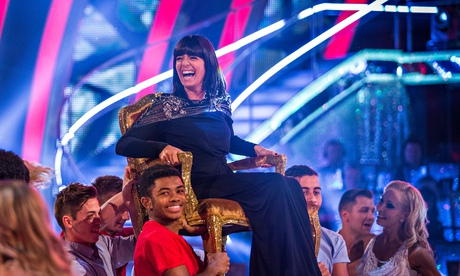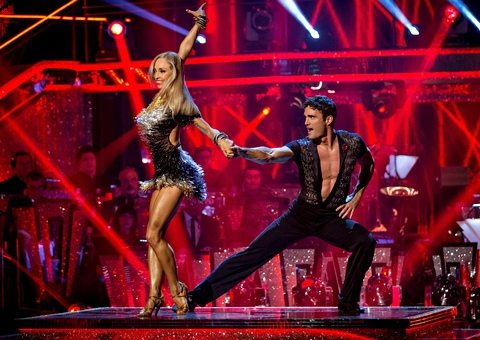A slightly rickety glitterball makes for an unlikely weapon of mass disruption. But when Strictly Come Dancing returned to BBC1 last week it felt like ITV’s worst fears had come true, the BBC1 dance show sticking a sequinned stiletto into The X Factor just two weekends into its high-profile revamp.
Strictly Come Dancing had an overnight audience of 8.7 million viewers against The X Factor’s 7.5 million in the Saturday night ratings battle. In the 20 minutes or so when the two were head-to-head, the BBC’s lead nearly tripled to around 3 million.
All this after ITV director of television Peter Fincham had appealed to the BBC to avoid a clash of the talent show titans, accusing the BBC of trying to “clip The X Factor’s wings”.
In truth the Simon Cowell show has been losing altitude for some time now, successive revamps failing to halt its decline since its extraordinary high in 2010 when a five-minute peak of nearly 20 million viewers watched Matt Cardle’s win. Last year’s final – won by Ben Haenow – peaked with 10.5 million.
ITV’s unprecedented decision to publish the broadcast times for the whole new series of The X Factor to avoid a clash with Strictly was either an olive branch or a white flag, depending on your point of view.
Either way it was rebuffed by the BBC which said it schedules its programmes “with licence fee payers in mind” – not ITV advertising revenues – “and they tell us they want high quality entertainment at the heart of the Saturday night schedule”. “We always try to avoid clashes,” it added.
Except, reasoned ITV, it could try a bit harder, like three years ago when the BBC was accused of dirty tricks after The Voice, then in its first series, over-ran by three minutes, robbing Cowell’s other ITV show, Britain’s Got Talent, of a chunk of its audience.
Saturday night ratings wars are nothing new – Michael Grade last year made a whole documentary tracing the history of such battles for BBC4 – but the stakes are higher at a time when new hits are thin on the ground. Channel 4 chief creative officer Jay Hunt said last month it had been the “best part of a decade” since anything had come along to “redefine what entertainment looks like on television”.
With the size and future funding of the BBC up for grabs as part of the renewal of its royal charter, there is also a political element to Strictly entirely absent in previous years.
Hunt had some sympathy with ITV, saying the BBC should “at least pause for a moment” before “aggressively trying to clip it … because it has an impact”. Others were less understanding. “I don’t quite understand the argument ITV are making,” said another senior industry figure. “Are they saying whenever the BBC has a successful show they should schedule it in such a way that it doesn’t impact at all on ITV? Strictly was designed as a Saturday night show – where else are they going to put it?”
In the on-demand era, scheduling clashes are not what they once were. Of the total consolidated audience of 9.6 million for the first episode of The X Factor, broadcast on 29 August with a new panel featuring Rita Ora and Nick Grimshaw, 2 million viewers recorded it and watched it in the subsequent seven days, a 26% rise on the overnights.
There was further consolation for ITV among the key advertiser demographics. Last Saturday’s X Factor – the first to go up against Strictly – was ahead of the BBC1 show in every age group up up to 55, including 1.7 million 16 to 34-year-olds, double Strictly’s 887,000.
Among viewers aged over 65, Strictly leapt ahead with 3.2 million, nearly triple The X Factor’s 1.1 million.
A source close to the ITV show said: “If this was the US, where the Nielsen ratings are based on key demos for advertisers, X Factor would be miles ahead.”
This year’s rivalry is complicated by ITV’s coverage of the Rugby World Cup, which means there are no Saturday editions of The X Factor for a month. It will be replaced by expanded two-hour Sunday shows before normal service is resumed on 24 October when there will be the first Saturday night clash between the pair since last week’s Strictly launch.
Given the lengthy running time of the two shows – the returning Saturday edition will be two and a half hours – some kind of overlap is surely inevitable.
Such scheduling clashes are not restricted to Saturday nights. Next Wednesday ITV has scheduled the second half of an hour-long live edition of Coronation Street, part of the channel’s 60th birthday celebrations, and an extra edition of Emmerdale against BBC1’s biggest show, The Great British Bake Off. ITV said it was an extension of Coronation Street’s regular Wednesday night slot.
Before then ITV has an even bigger weekend when a two-hour X Factor will be followed on Sunday by a 90-minute opener for the last series of Downton Abbey. It is a Strictly-free zone, with the Julian Fellowes drama going head to head with BBC1’s one-off adaptation of The Go-Between. Some kind of go-between might ease the friction between ITV and the BBC, although as the teenage protagonist Leo Colston discovered in LP Hartley’s novel, it is an unforgiving task.











